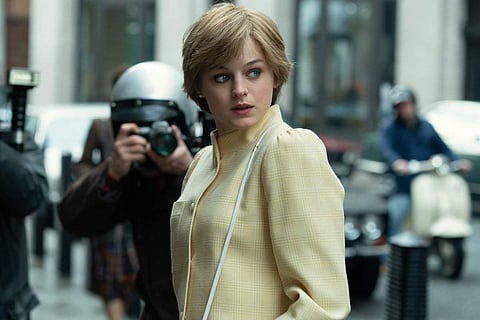The Crown Season 4 Web Series Review: Royalty and solitary confinement
Rating:(3 / 5)
In Netflix's The Crown, the word "eventually" is uttered often. Either that or something close to its meaning is stressed — that give any problem the time and it will sort itself out or go away. Queen Elizabeth II (Olivia Coleman) uses it as her favourite strategy, her unsentimental response to anything remotely familial or political, suggesting inaction as solution. In its latest season, The Crown eventually comes around to self-realisation or self-awareness. Maybe it has to do with a larger audience having better memory of the season's focus — the Thatcher years and Diana, Princess of Wales.
The show is finally ready to interrogate royalty's status in the modern world and by way of that, its own entitlement in present-day pop culture. It still can't completely shrug off the unhealthy British regard for the monarchy, but it is more incisive than the previous seasons in showing the family its rightful, dysfunctional place. It does so by bringing in an outsider. Diana (Emma Corrin) might belong to nobility, but it is through her we pierce the icy veins of this family and this is laid bare by a potent affliction — isolation.
The Crown adopts the chilly and dark Scottish lands of Balmoral Castle and the vast chambers of palatial dwellings to reflect this feeling of neglect and confinement. Even Diana's opening scene is in a large hallway with her in costume for A Midsummer Night's Dream, maybe a fairy servant and seemingly unnoticeable. When Diana charms the family, everyone is ready to welcome her as the future Princess of Wales. Prince Charles (Josh O'Connor) is not so sure, and Princess Margaret (Helena Bonham Carter) is the only one who is able to cut through the tension that exists in place of chemistry. Engaged to be married and royal, Diana is isolated in a Buckingham Palace wing, the rest of the family incommunicado, as is Charles.
Creator: Peter Morgan
Cast: Olivia Coleman, Tobias Menzies, Josh O'Connor, Emma Corrin
Streaming on: Netflix
Throughout this season, we see Diana in confinement, occupying a tiny space in large rooms and suffering through her eating disorder as a result in large bathrooms. The family's coldness and penchant for tradition over care is reflected in these moments and Diana's parental instincts are shown in opposition to the Queen's lack thereof.
The Crown and Peter Morgan return to their favourite Shakespearean metaphors. If it was Richard II in the third season to underline Charles' indecisiveness and lack of natural leadership, season four is abound with the suffering working class of UK equated with King Lear, a foolish lot in search of deliverance and hoping to find it between Margaret Thatcher (Gillian Anderson) and the Queen. The Charles-Diana relationship is also deconstructed by a rendition of Othello, at the end of which Diana awes the audience with her own dissident performance that waters and feeds the Othellian conniption in Charles. In contrast, the Maori symbolism to portray the terrifying dance that is their marriage can be troubling.
But there is one person who revels in isolation. This season's political strand follows Thatcher's time at 10 Downing Street, with her iron hand and dictatorial ways giving pause to even the sovereign. The Crown in these portions does straddle stormy waters, showing the Queen in the aspirational role of a benevolent monarch who takes the reins to control Thatcher's unflinching ways to rule over her cabinet, be it the spending cuts, the escalating situation in the Falkland Islands at a time of unemployment and economic volatility, or her refusal to impose sanctions on South Africa for the apartheid regime, the rest of the Commonwealth firm in their stand against it except for her. There's a hint that her son has business interests in South Africa, but when the British royalty is shown to balk at the fascist and racist views of Thatcher, it does strike a discordant note. It seems like a course correction for the modern times that has no basis, only co-opted to keep the focus on the show's protagonist as a progressive and evolving heroine, coming off as even revisionist in that regard.
Indifference is not only shown as a malaise within the family, but something felt by the country thanks to Thatcher. Public opinion and anger are reflected through an unemployed man neglected by the state, his wife, and children. This plot point neatly dovetails into the introspective nature of the season, The Crown finally looking within by way of Princess Margaret seeking professional help for her mental health issues on the advice of Charles, who cites himself as the guinea pig who has seen success in that department. "Are you aware of anyone else in the family with mental health issues?" Margaret asks the Queen. Where does one start? Diana trapped in royal prison while playing to the galleries as the charming commoner or the gaslighting Charles, refusing to change or grow up.
While Carter and Coleman are reliable as ever, Corrin is quietly incredible in a role that was ripe for scrutiny as soon as the casting was announced. She paints Diana with a shade of humanity unseen by the public and photographers' eye, only behind closed doors and in the middle of large rooms. It could be inaccurate, but it is anything but unimaginative. The Crown remains refreshed owing to her.

